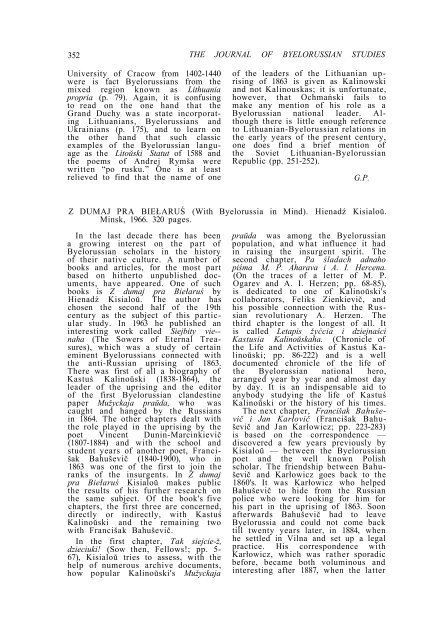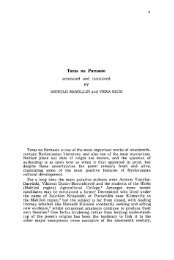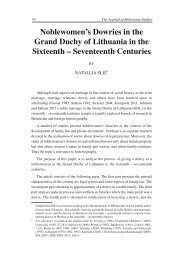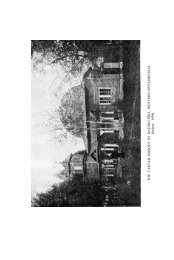Reviews - The Journal of Belarusian Studies
Reviews - The Journal of Belarusian Studies
Reviews - The Journal of Belarusian Studies
You also want an ePaper? Increase the reach of your titles
YUMPU automatically turns print PDFs into web optimized ePapers that Google loves.
352 THE JOURNAL OF BYELORUSSIAN STUDIES<br />
University <strong>of</strong> Cracow from 1402-1440<br />
were is fact Byelorussians from the<br />
mixed region known as Lithuania<br />
propria (p. 79). Again, it is confusing<br />
to read on the one hand that the<br />
Grand Duchy was a state incorporating<br />
Lithuanians, Byelorussians and<br />
Ukrainians (p. 175), and to learn on<br />
the other hand that such classic<br />
examples <strong>of</strong> the Byelorussian language<br />
as the Litoŭski Statut <strong>of</strong> 1588 and<br />
the poems <strong>of</strong> Andrej Rymša were<br />
written “po rusku.” One is at least<br />
relieved to find that the name <strong>of</strong> one<br />
<strong>of</strong> the leaders <strong>of</strong> the Lithuanian uprising<br />
<strong>of</strong> 1863 is given as Kalinowski<br />
and not Kalinouskas; it is unfortunate,<br />
however, that Ochmański fails to<br />
make any mention <strong>of</strong> his role as a<br />
Byelorussian national leader. Although<br />
there is little enough reference<br />
to Lithuanian-Byelorussian relations in<br />
the early years <strong>of</strong> the present century,<br />
one does find a brief mention <strong>of</strong><br />
the Soviet Lithuanian-Byelorussian<br />
Republic (pp. 251-252).<br />
G.P.<br />
Z DUMAJ PRA BIEŁARUŚ (With Byelorussia in Mind). Hienadź Kisialoŭ.<br />
Minsk, 1966. 320 pages.<br />
In the last decade there has been<br />
a growing interest on the part <strong>of</strong><br />
Byelorussian scholars in the history<br />
<strong>of</strong> their native culture. A number <strong>of</strong><br />
books and articles, for the most part<br />
based on hitherto unpublished documents,<br />
have appeared. One <strong>of</strong> such<br />
books is Z dumaj pra Biełaruś by<br />
Hienadź Kisialoŭ. <strong>The</strong> author has<br />
chosen the second half <strong>of</strong> the 19th<br />
century as the subject <strong>of</strong> this particular<br />
study. In 1963 he published an<br />
interesting work called Siejbity vienaha<br />
(<strong>The</strong> Sowers <strong>of</strong> Eternal Treasures),<br />
which was a study <strong>of</strong> certain<br />
eminent Byelorussians connected with<br />
the anti-Russian uprising <strong>of</strong> 1863.<br />
<strong>The</strong>re was first <strong>of</strong> all a biography <strong>of</strong><br />
Kastuś Kalinoŭski (1838-1864), the<br />
leader <strong>of</strong> the uprising and the editor<br />
<strong>of</strong> the first Byelorussian clandestine<br />
paper Mužyckaja praŭda, who was<br />
caught and hanged by the Russians<br />
in 1864. <strong>The</strong> other chapters dealt with<br />
the role played in the uprising by the<br />
poet Vincent Dunin-Marcinkievič<br />
(1807-1884) and with the school and<br />
student years <strong>of</strong> another poet, Francišak<br />
Bahuševič (1840-1900), who in<br />
1863 was one <strong>of</strong> the first to join the<br />
ranks <strong>of</strong> the insurgents. In Z dumaj<br />
pra Biełaruś Kisialoŭ makes public<br />
the results <strong>of</strong> his further research on<br />
the same subject. Of the book's five<br />
chapters, the first three are concerned,<br />
directly or indirectly, with Kastuś<br />
Kalinoŭski and the remaining two<br />
with Francišak Bahuševič.<br />
In the first chapter, Tak siejcie-ž,<br />
dzieciuki! (Sow then, Fellows!; pp. 5-<br />
67), Kisialoŭ tries to assess, with the<br />
help <strong>of</strong> numerous archive documents,<br />
how popular Kalinoŭski's Mužyckaja<br />
praŭda was among the Byelorussian<br />
population, and what influence it had<br />
in raising the insurgent spirit. <strong>The</strong><br />
second chapter, Pa śladach adnaho<br />
piśma M. P. Aharava i A. I. Hercena.<br />
(On the traces <strong>of</strong> a letter <strong>of</strong> M. P.<br />
Ogarev and A. I. Herzen; pp. 68-85),<br />
is dedicated to one <strong>of</strong> Kalinoŭski's<br />
collaborators, Feliks Zienkievič, and<br />
his possible connection with the Russian<br />
revolutionary A. Herzen. <strong>The</strong><br />
third chapter is the longest <strong>of</strong> all. It<br />
is called Letapis žyćcia i dziejnaści<br />
Kastusia Kalinoŭskaha. (Chronicle <strong>of</strong><br />
the Life and Activities <strong>of</strong> Kastuś Kalinoŭski;<br />
pp. 86-222) and is a well<br />
documented chronicle <strong>of</strong> the life <strong>of</strong><br />
the Byelorussian national hero,<br />
arranged year by year and almost day<br />
by day. It is an indispensable aid to<br />
anybody studying the life <strong>of</strong> Kastuś<br />
Kalinoŭski or the history <strong>of</strong> his times.<br />
<strong>The</strong> next chapter, Francišak Bahuševič<br />
i Jan Karłovič (Francišak Bahuševič<br />
and Jan Karłowicz; pp. 223-283)<br />
is based on the correspondence —<br />
discovered a few years previously by<br />
Kisialoŭ — between the Byelorussian<br />
poet and the well known Polish<br />
scholar. <strong>The</strong> friendship between Bahuševič<br />
and Karłowicz goes back to the<br />
1860's. It was Karłowicz who helped<br />
Bahuševič to hide from the Russian<br />
police who were looking for him for<br />
his part in the uprising <strong>of</strong> 1863. Soon<br />
afterwards Bahuševič had to leave<br />
Byelorussia and could not come back<br />
till twenty years later, in 1884, when<br />
he settled in Vilna and set up a legal<br />
practice. His correspondence with<br />
Karłowicz, which was rather sporadic<br />
before, became both voluminous and<br />
interesting after 1887, when the latter





